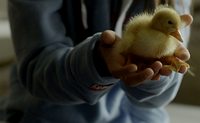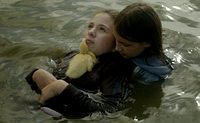Each chirp was thoroughly discussed
 For the third time in a row Belgian brothers Olivier & Yves Ringer produced a film for a young audience. In BIRDS OF PASSAGE (‘Les Oiseaux de Passage’) the timid Cathy and her wheelchair bound friend Margaux take care of a duckling. Cathy got the egg as a birthday gift, but the duckling chose Margaux as her ‘mother’, despite the fact that she can’t take care of the animal. They leave in secret on a trip to the river delta, to set the duckling free, to the despair of their over-concerned parents.
For the third time in a row Belgian brothers Olivier & Yves Ringer produced a film for a young audience. In BIRDS OF PASSAGE (‘Les Oiseaux de Passage’) the timid Cathy and her wheelchair bound friend Margaux take care of a duckling. Cathy got the egg as a birthday gift, but the duckling chose Margaux as her ‘mother’, despite the fact that she can’t take care of the animal. They leave in secret on a trip to the river delta, to set the duckling free, to the despair of their over-concerned parents.
The work of the Ringers (with Yves mainly engaged in production and Olivier in directing) is very consistent: fair cinema from a child’s point of view, without concessions and on a minimum budget. The formula works: predecessor ON THE SLY was an award magnet. The movie gleaned prizes at every children’s film festival. Will BIRDS OF PASSAGE write a similar success story? The film’s first festival appearances in Montreal (FIFEM) and Zlin were awarded with the prizes of respectively the International and the ECFA Juries. Although BIRDS OF PASSAGE is more light-footed, similarities with ON THE SLY can’t be denied.

The overprotecting of children is definitely a recurring theme. Cathy doesn’t even have a bike, because her mother thinks it’s too dangerous.
Olivier Ringer: This is indeed one of the movie’s main ideas. Today children and adults are so controlled that we fear any shred of freedom. Mobile phones, among others, limit children in their autonomy, allowing parents to keep a close eye on them and know where they are. In our movies, we wonder how children cope with this minimal freedom.
Yves Ringer: We have to trust children. They should have the opportunity to experiment. We shouldn’t decide everything for them.

What were the Ringer brothers like when they were little?
Yves: Always together.
Olivier (smiling): He had an older brother, you know!
Yves: We always took the bus to school together. Our parents were out working, so in the evenings we arrived alone at home.
Olivier: Next to our house was a big, fallow plot full of bunkers where we used to play all the time. The adventures experienced there have marked my childhood. Until my parents…
Yves: Our parents!
Olivier:… decided to move. I was 13 years old, and suddenly I lost that freedom, that space. It gave me a very tough time.
Yves: I played football around the church, to the annoyance of the pastor and there were little streams and ponds where we could play on our own.

The characters in your movies are still looking for that care-free adventure.
Olivier: The highlight of the winter season was snowball fights and sliding on frozen puddles. Nowadays in winter, the school board sends the children inside. Imagine someone might slip and fall. We constantly warn our children: ‘Watch out! Be careful, something might happen!’ I find this message of fear highly disturbing. On the other hand, our father was a furniture maker, always busy with big machines with which you had to be very careful. ‘Watch out,’ is thus a message I’ve heard all my life.
The care for the duckling puts a strain on Margaux’ shoulders. How does it change her?
Yves: Her parents allow her not a single responsibility. They decide everything for her, as if Margaux isn’t capable herself. Until she suddenly becomes a mother… of a duckling.
Oliver: We do not realise how important this total dependency is for someone with limitations. If Margaux wants to go somewhere, she needs someone. If she wants to eat, she needs someone. She constantly needs someone to live her life. To make her less dependent, we had to think constantly of creative solutions.
 Her friend looks remarkably passive. Cathy sometimes makes a lethargic impression.
Her friend looks remarkably passive. Cathy sometimes makes a lethargic impression.
Olivier: Her mother is a strict conformist, while her father always remained an adolescent, for whom Cathy is a bit ashamed. Clarisse (Djuroski, who plays Cathy) embodies this doubt very accurately. We chose her because of her restrained expressiveness, while radiating an enormous inner intensity.
Yves: Cathy and Margaux had to be a balanced duo. You can really believe they are best friends. It wouldn’t work with a more exuberant Cathy.
Let’s talk about the real hero of this movie.
Olivier: The duckling!
 Even the duck egg, shining in the humming greenhouse, has a certain halo of ‘magic’.
Even the duck egg, shining in the humming greenhouse, has a certain halo of ‘magic’.
Yves: An egg is magical. Imagine: inside grows a living creature that can hatch at any time. Isn’t it wonderful? If you give it the warmth it needs, a process is put into operation. The magic of life!
Oliver: Not only warmth, but also love. Clarisse took home one of our cute ducklings. That night everyone at home was woken up by deafening chirps. Only when Clarisse cuddled it against her, the duckling calmed down.
Yves: We had only yellow ducklings on the set. One day arrived, by mistake, a duckling with a black spot. The little animal felt different from the others, withdrew itself from the group and died. So important is the sense of belonging.
 Talking about chirps: the sound of the duckling is omnipresent on the soundtrack.
Talking about chirps: the sound of the duckling is omnipresent on the soundtrack.
Yves: Those animals chirps continuously to get the confirmation of where the mother and the other family members are.
Olivier: In reality it is much worse than in the movie. This continuous chirp is extremely stressful for the ears. That’s why we’ve adapted each ‘chirp’ separately: the aggressiveness of the sound had to be flattened. Each chirp has a different meaning. An absolute hell for the sound technician, as the chirps had to be filtered out of the dialogue. You could say that each chirp was thoroughly discussed. On the other hand the duck legs are the work of a sound engineer. What he did in his own rhythm, was much more enjoyable than the real footsteps. Ducks are going incredibly fast, you know.
 I fear that the scene in the duck farm, where ducklings are liquidated at a massive scale, needs some additional explanation.
I fear that the scene in the duck farm, where ducklings are liquidated at a massive scale, needs some additional explanation.
Yves: Every week, Japanese specialists come to the nursery to determine the sex of the ducklings. The males are crammed. The females disappear into a tube, which according to the movie, leads to ‘bird paradise’. A soothing metaphor. You can’t just tell children that ducklings are ‘thrown away and murdered’ through a mechanical process.
Olivier: We have no industrialised duck farms in Belgium. The scene was filmed in a turkey nursery. A few minutes after they’re hatched, turkey chickens are put on a conveyor belt to separate the males from the females. The females disappear into ‘the hole’ and the males’ beaks are cut immediately. Otherwise they would eat each other.
The duckling hasn’t got a name! Don’t children always give the subject of their affection a name?
Olivier: We didn’t want that. It’s just a duckling. I don’t want to define or name the animal.
Yves: Our first movie was called LE POULAIN (The Foal). The distributor named it POM LE POULAIN and it immediately attracted a much younger audience.
The landscape profoundly determines the mood of the movie.
Olivier: It is extremely difficult in that area to find a place which gives you a ‘spatial’ feeling. The movie was filmed on a maximum of 200 metres. If we moved the camera 20 metres forward or backward, it didn’t work anymore as we would show traces of human presence. Belgium is so densely built that you can hardly create an atmosphere. We found only two strips of 150 meters where we could film. For the first shot of dad on the bike, I drove many miles to find the right perspective.
There are more brother duo’s at work in the movie world: the brothers Dardenne, Coen, Taviani,…
Yves: It is an advantage. The making of a movie is a long and complicated process, in which you sometimes appreciate a second opinion. As brothers you have a number of common references and you know each other’s weaknesses.
Olivier (smiling): I know his weaknesses and he knows my qualities.
Gert Hermans
